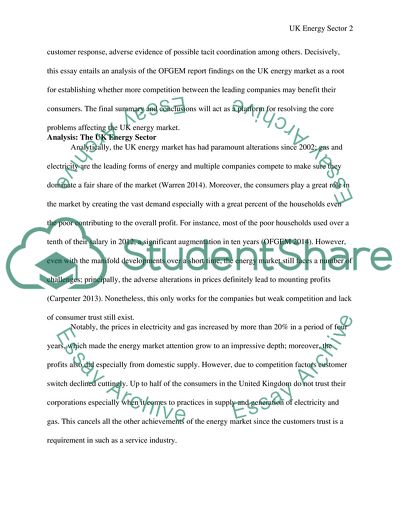Cite this document
(Discuss the findings of the OFGEM report with regards to the UK energy Coursework - 3, n.d.)
Discuss the findings of the OFGEM report with regards to the UK energy Coursework - 3. https://studentshare.org/macro-microeconomics/1858907-discuss-the-findings-of-the-ofgem-report-with-regards-to-the-uk-energy-market-and-discuss-if-more-competition-between-the-big-six-uk-energy-firms-may-benefit-uk-consumers
Discuss the findings of the OFGEM report with regards to the UK energy Coursework - 3. https://studentshare.org/macro-microeconomics/1858907-discuss-the-findings-of-the-ofgem-report-with-regards-to-the-uk-energy-market-and-discuss-if-more-competition-between-the-big-six-uk-energy-firms-may-benefit-uk-consumers
(Discuss the Findings of the OFGEM Report With Regards to the UK Energy Coursework - 3)
Discuss the Findings of the OFGEM Report With Regards to the UK Energy Coursework - 3. https://studentshare.org/macro-microeconomics/1858907-discuss-the-findings-of-the-ofgem-report-with-regards-to-the-uk-energy-market-and-discuss-if-more-competition-between-the-big-six-uk-energy-firms-may-benefit-uk-consumers.
Discuss the Findings of the OFGEM Report With Regards to the UK Energy Coursework - 3. https://studentshare.org/macro-microeconomics/1858907-discuss-the-findings-of-the-ofgem-report-with-regards-to-the-uk-energy-market-and-discuss-if-more-competition-between-the-big-six-uk-energy-firms-may-benefit-uk-consumers.
“Discuss the Findings of the OFGEM Report With Regards to the UK Energy Coursework - 3”. https://studentshare.org/macro-microeconomics/1858907-discuss-the-findings-of-the-ofgem-report-with-regards-to-the-uk-energy-market-and-discuss-if-more-competition-between-the-big-six-uk-energy-firms-may-benefit-uk-consumers.


